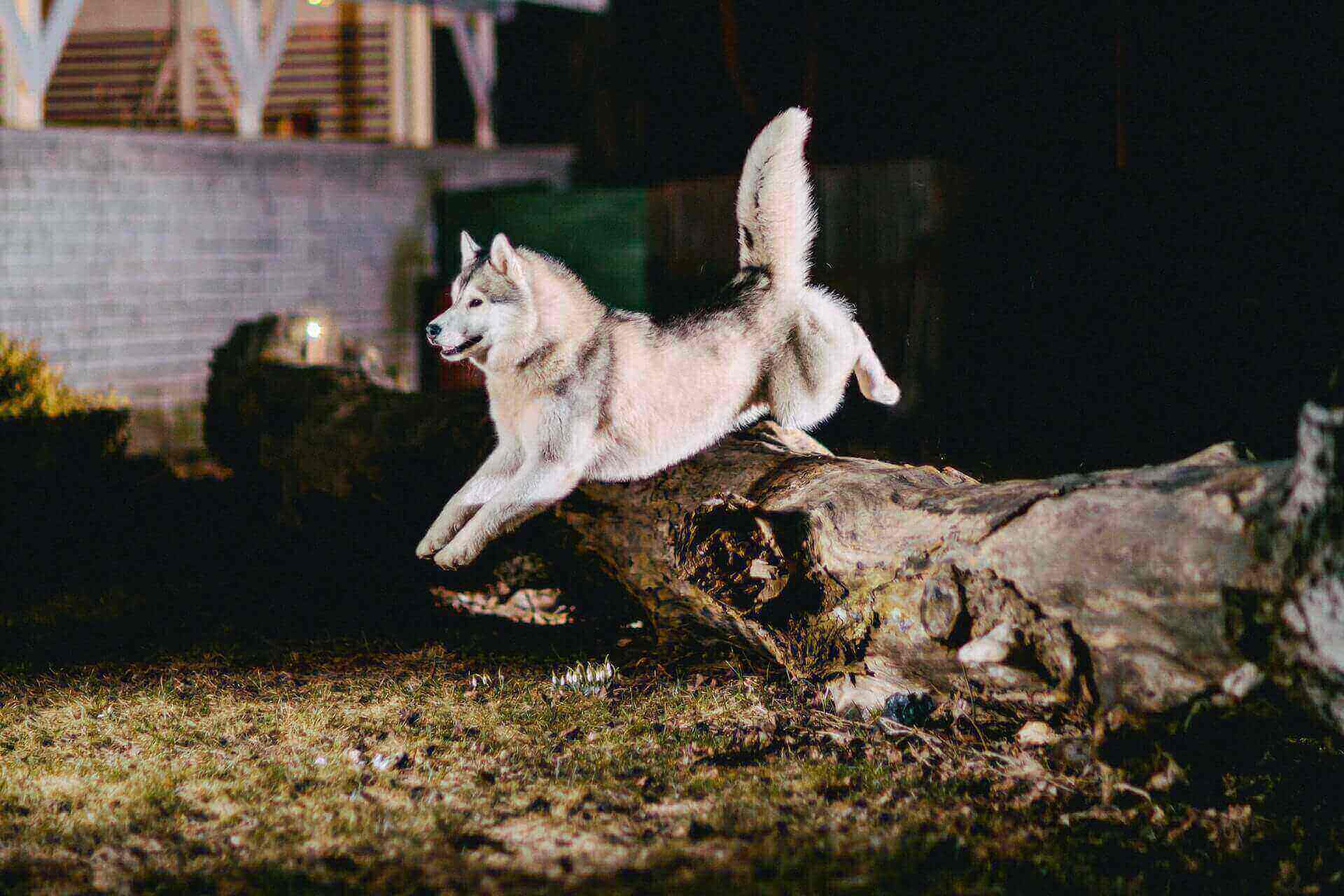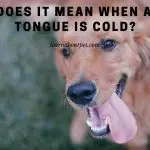Why don’t dogs sweat? Dogs do sweat, but it is not like humans. They have slightly different perspiration physiology. In this article, allow us to clarify how dogs sweat through two different sweat glands.
Is It True That Dogs Don’t Sweat?
Assuming that dogs don’t sweat is a mistake. Many folks ask why don’t dogs sweat even after heavy exercise. And, if they do not sweat, how do they cool off?
Their cooling mechanism mainly involves panting. You must have seen your pet hanging out his tongue, and breathing heavily. That’s his unique cooling mechanism.

Your pet does not have typical sweat glands distributed throughout the body. Most of his sweating occurs from the paw pads.
This is the reason why dont dogs sweat from their skin like us. Their sweating is limited to specific areas that do not have furs.
Do dogs sweat from their nose? The snout is another area that has sweat glands. Now you know why that cute nose feels damp to touch.
Do Dogs Ever Sweat?
Why don’t dogs sweat as we do? It is a natural adaptation method. Consider this. If they sweated like us, they would end up having matted fur.
Having a constant matted fur does not help with cooling off. It is instead more of an inconvenience. That’s the reason why don’t dogs sweat water from their fur-body.
Then, why do many owners report dog soaked in sweat? It’s a misconception.
The gland associated with the hair follicles of the dog is the apocrine gland. It does not produce sweat. Instead, it releases a thick secretion rich with pheromones.
The secretion from apocrine glands gives each dog his unique odor signature. They, however, do not help with thermoregulation. This explains why don’t dogs sweat from the fur follicles.
If you are thinking why don’t dogs sweat ever, you might have carpeted floors. Wet paw marks are more visible over wooden or concrete floors than on carpets.
You can check it directly by touching their paw pads. Look it up especially after your dog has had some kind of physical exertion. It should feel wet.
In summer, the paw pads can get wet even without playtime.
Stress is another reason why you would see damp paw prints. Why does a stressed dog sweat is unclear from an evolutionary perspective. It is thought to provide aid to the flight response in a scared animal.
‘Why does my dog feel sweaty?’ It may be happening because your pup has separation anxiety. It is a major issue for many dogs. Owners must take adequate steps to help their pets.
Does A Dog Sweat Through Its Mouth?
No, a dog does not sweat through its mouth. Why don’t dogs sweat by the mouth is obvious. Mouths do not have sweat glands.
But the relief offered by panting is similar to the evaporation of sweat in us. The touch of breeze over a sweaty body feels cool. Similarly, the evaporation of saliva from their open mouths creates a cooling sensation.
It also cools the inner lining of their lungs.
What about the odor coming from the dog’s mouth? It is not due to apocrine gland secretions. But of course, the smell from apocrine secretions can mix with bad breath. This might create the confusion that dogs sweat by their mouths.
Do not take bad breath in dogs for granted. It may indicate the buildup of plaque and tartar in a dog’s teeth. In severe cases, it may be a symptom of gum disease.
Look up remedies on how to deal with halitosis in dogs. You know why dont dogs sweat by panting. So, if there’s bad breath, it has nothing to do with lack of exercise or stress.
Why Is My Dog Sweating So Much?
It is important to differentiate between merocrine and apocrine glands. Merocrine glands produce dog sweat. They are not present in regions covered with fur. It is why dont dogs sweat from regions such as the back and belly.
The sparse presence of merocrine glands is why don’t dogs sweat from their furs. Apocrine glands release pheromones that help dogs to identify each other.
If your dog has sweaty skin, it means there is an excess of apocrine secretion. It can be a direct response to a skin condition such as rashes or hot spots.
Rashes or hot spots are in turn symptoms of various health problems. They may indicate food intolerance in your pet. They may also happen due to different allergens such as food items, pollens, and fleas.

Why don’t dogs sweat from all over their body? Some folks ask, “why my dog sweats under arms.” You should have a clear idea of the difference between the two types of glands.
| Apocrine | Merocrine |
| A type of Epitrichial glands | A type of Eccrine glands |
| The cell membrane around cytoplasmic content actively breaks down. This is why don’t dogs sweat like you. | The secretion is by exocytosis. |
| The secretion is in the gland lumen. | It is released directly on the skin surface. |
| Found in hair follicles throughout the body. | Found on paw pads and nose. |
Do dogs sweat in their armpits? The above differentiation should explain this. It is not technically ‘sweat’ or a watery secretion. Instead, it is apocrine secretion consisting of cytoplasmic content.
Both apocrine and merocrine glands are coiled, tubular structures. This is why you can classify either as sweat glands. The difference in them puts in perspective why don’t dogs sweat as humans do.
Smelly Paws In Dogs
Having smelly paws is another problem associated with canine sweating. Due to its particular smell, it is described as ‘Frito feet’ or ‘Popcorn feet’.
As dogs walk barefoot (quite naturally), dirt gets lodged in between their toes. Dirty water also finds its way into these regions. Dirt consists of proteus and pseudomonas bacteria. Combined with sweat, these cause smelly paws. Snow balls in Dog’s Paws can also have the same effect in winter.
As their paws get itchy, dogs may lick and chew vigorously at their paws. Their saliva and sweat produce an ideal environment for bacteria to thrive.
You should take remedial measures. One of these remedies includes the application of special paw balms. These balms create a protective barrier over the paws. It effectively prevents contact with water and dirt.
However, you should not overuse them. Among other problems, they can block the sweat glands on the paws. This can cause discomfort in your pet.
Overuse can also soften the paws. This makes them vulnerable to develop wounds. Just take a little bit on your fingertips and apply it on the paws before going outdoors.
Alternately, you can give your pet a foot sauna with warm water. You may also add some chamomile tea extract in the water to unclog blocked sweat glands.
Do Dogs Sweat On Their Stomach?
Can dogs sweat on their head? Do dogs sweat on their stomach? The answers to these questions should be evident by now.
If the stomach is feeling greasy, it is due to apocrine secretions. Is your dog sweating in sleep? It may indicate that the surrounding where the dog lives is very warm.
Change the sleeping place to a shaded, cool area. This should solve this problem.
Never shave a dog’s coat to help them with sweating. You are taking away the natural insulation from his body. You know why don’t dogs sweat from their bellies.
Remember, dogs do not have an extensive sweating mechanism. This makes them susceptible to heat strokes in summer. It might be fatal for the poor animal. Always take proper precautions to avoid this.
Final Verdict – Why Don’t Dogs Sweat
Dogs do sweat. They have two types of sweat glands. Apocrine glands secrete an oily fluid laden with pheromones. These are found all over the dog’s body.

Merocrine glands secrete perspiration. However, you can find these only in specific regions. These include the paw pads and the nose. Dogs love to be pet after a great play day. Show them some love!

Welcome to Learn About Pet. My name is Rajkumar Ravichandran and I love all pets, travel, and amazing food. I write about my passion and personal experience caring for multiple pets in this blog! ❤️
Post Disclaimer
DISCLAIMER: THIS BLOG OR WEBSITE, "Learn About Pet", DOES NOT PROVIDE YOU WITH MEDICAL ADVICE AND IS NOT A SUBSTITUTE FOR MEDICAL ADVICE. ALWAYS GET IN TOUCH WITH YOUR PERSONAL VETERINARIAN AND USE INFORMATION HERE AS GENERAL ADVICE.
The information, including but not limited to, text, graphics, images and other material contained on this website are for informational purposes only. No material on this site is intended to be a substitute for professional veterinary advice, food recommendation, diagnosis, or treatment. Always seek the advice of your veterinarian or other qualified health care provider with any questions you may have regarding a medical condition or for pet food related questions.







